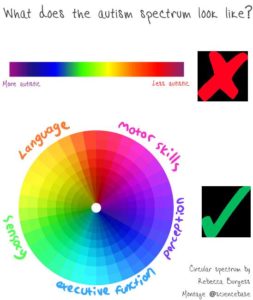Superhero or child
These are the two categories that neurotypicals classify individuals on the spectrum, formally known as high-functioning and low-functioning. But the question that I have to ask is this: high or low, to what function are they referring to? Overall, this over-generalized perception of autistic individuals has affected what people expect of them.
For example, at the Christian school I attended, everyone knew me as the daughter of the high school science teacher. When I played for my volleyball team, the coach suggested that I can use my “scientific calculations” to pinpoint where the ball would land and how to get to it. While I enjoyed my science classes and did very well in my academics, I was no genius scientist by any stretch and loved other things besides science. However, everyone else had set this high expectation of my capabilities and who I was as a person, as if I was some all-knowing superhero or computer. If I failed to meet their expectations of me, they would either ignore me or accuse me of being the other extreme — a stupid child. They only judged me for what I did and not for who I was as a whole.
It is natural to generalize something that is hard to understand, but this tendency can also be harmful. It causes teachers to not properly challenge autistic students in their academics, parents to be neglecting or over-bearing of their child, and employers to give out mundane or stressful tasks that employees never applied for.
 A proper understanding of an autistic individual’s functioning is illustrated as more of a color wheel (left), rather than a linear line of “more autistic” and “less autistic.”
A proper understanding of an autistic individual’s functioning is illustrated as more of a color wheel (left), rather than a linear line of “more autistic” and “less autistic.”
While someone can be low in language, they may have high perception of things. If one is very coordinated in motor skills, they also can be very sensitive to what is around them. I like the principle taught in many of my education classes about teaching the child as a whole, not just their head. This principle also applies in knowing those on the autism spectrum as well.
Though we have many challenges, we also have aspirations, interests, and things that we are good at. As far as setting expectations, get to know all that we can do and who we are as persons before setting goals that are challenging, yet doable.
Thank you Rebekah, for another excellent insight from the viewpoint of an autistic adult. Often people in general make quick judgements based on surface assumptions. It takes time to get to know someone and communication is the key for successful outcomes.



